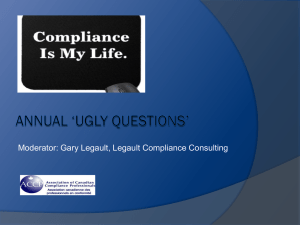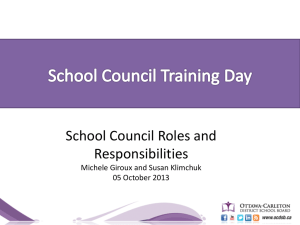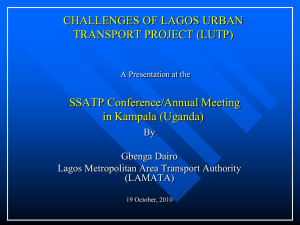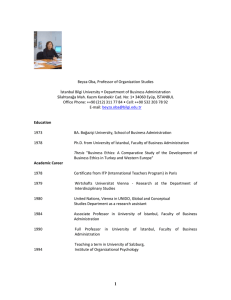local government reforms chieftaincy issues and rural area
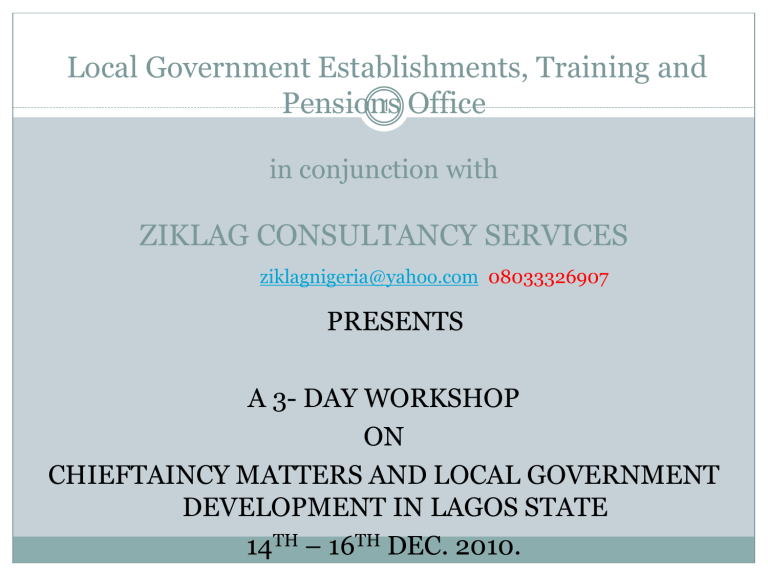
Local Government Establishments, Training and in conjunction with
ZIKLAG CONSULTANCY SERVICES ziklagnigeria@yahoo.com
08033326907
PRESENTS
A 3- DAY WORKSHOP
ON
CHIEFTAINCY MATTERS AND LOCAL GOVERNMENT
DEVELOPMENT IN LAGOS STATE
14 TH – 16 TH DEC. 2010.
LOCAL GOVERNMENT REFORMS,
CHIEFTAINCY ISSUES AND RURAL
AREA TRANSFORMATION IN LAGOS
STATE
BY
BANJI FAJONYOMI
2
The Concept of Local Government
The concept of local government involves a philosophical commitment to democratic participation in the governing process at the grassroots level. This implies legal and administrative decentralisation of authority, power and personnel by a higher level of government to a community with a will of its own, performing specific functions as within the wider national framework. A local government is a government at the grassroots level of administration
“meant for meeting peculiar grassroots need of the people (Agagu, 1997:18).
3
Cont’d
• It is defined as “government by the popularly elected bodies charged with administrative and executive duties in matters concerning the inhabitants of a particular district or place (Appadorai, 1975:287).
Looking at the existence, performance and relevance of local government, Laski
Local government can also be defined as that tier of government closest to the people, “which is vested with certain powers to exercise control over the affairs of people in its domain” (Lawal,2000:60).
4
Cont’d
• The 1976 local government reform defines local government as: government at local level exercised through representative council established by law to exercise specific powers within defined areas. These powers should give the council substantial control over local affairs as well as the staff and institutional and financial powers to initiate and direct the provision of services and to determine and implement projects so as to complement the activities of the State and federal governments in their areas, and to ensure, through devolution of these functions to these councils and through the active participation of the people and their traditional institutions, that local initiative and response to local needs and conditions are maximized.
5
Characteristics
• Local government officials are elected.
• The local government unit must have a legal personality distinct from the State and Federal
Governments.
• The local government must have specified powers to perform a range of functions and finally,
• It must enjoy substantial autonomy. i.e. ability to make its own laws, rules and regulations; formulate, execute and evaluate its own plans and the right to recruit, promote, develop and discipline its own staff.
6
Why Local Government?
• It has been argued that local people will understand the problems confronting them more than other people and will be in better position to address the problems.
• Efficiency in the running of government projects.
• It provides opportunity for people to determine who should govern them at the local level.
• It promotes participation of the people in governance.
• It is a training ground for people in the act of governance.
This is why local government has been described as
“nurseries of democracy”
• It equally exists to provide services and serve as a vehicle for rural development
7
From NA to Local Government
• The precursor of local government was the native administration established by the colonial administration. As one of its principal authors posited, Native
Administration was:
• Designed to adapt to purposes of local government the tribal institutions which the native people have evolved for themselves so that the latter may develop in a constitutional manner from their own past, guided and restrained by the traditions and sanctions which they have inherited, moulded or modified as they may be on the advice of the British officers. It is an essential feature of the system, within the limitations, the British Government rules through these native institutions which are regarded as an integral part of the machinery of Government with well defined powers and functions recognised by Government and by law and not dependent on the caprice of an executive officer (Cameron 1934).
8
•
Regardless of nomenclature, local government is a creation of British colonial rule in Nigeria.
It has overtime experienced change in name, structure and composition. Between 1930s and 1940s, for instance, local government was known as chief-in-council and chief-andcouncil, where traditional rulers were given pride of place in the scheme of things.
9
• In the 1950s, election was introduced according to the British model in the western and eastern parts of the country with some measure of autonomy in personnel, financial and general administration.
• The pace of this development was more noticeable in the south than in the north.
• During this period, heterogeneity was the hallmark of local government as there was no uniformity in the system and the level of development was also remarkably different.
10
1976 Reforms
• The introduction of 1976 reforms by the military administration of General
Obasanjo brought about uniformity in the administrative structure of the system. The reforms introduced
• a multi-purpose single-tier local government system
• a population criterion under which a local government could be created.
Consequently, a population of within 150,000 to 800,000 was considered feasible for a local government. This was done to avoid the creation of non-viable local council and for easy accessibility.
• provision for elective positions having the chairmen as executive head of local government with supervisory councillors constituting the cabinet.
This was complemented by the bureaucrats and professionals, such as
Doctors, Engineers, etc., who were charged with the responsibility of implementing policies .
11
1976 Reforms and Traditional Rulers
• Under the 1976 reforms, a new structure known as the Traditional or Emirate Council was created in each local government area.
Among other functions, the Traditional/Emirate Council was charged with:
• formulating general proposals as advice to local governments;
• harmonizing the activities of local government councils through discussion affecting them generally, and giving advice and guidance to them;
• co-ordinating development plans of local governments by joint discussion and advise;
• making determinations on religious matters where appropriate;
• determining questions relating to chieftaincy matters and control of traditional titles and offices, except where these are traditionally the exclusive prerogative of the Emir or Chief in which case the
Council’s function shall be advisory to the Emir or Chief
12
Babangida Reforms
•
1987 Local government elections held on non-partisan basis despite the proscription of party politics and elections at the state and national levels.
Local government chairman elected by the local government at large rather than by council. Chairman empowered to appoint supervisory councilors (political heads of departments)
• National Electoral Commission empowered to conduct local elections.
• 1988 Ministry for Local Government abolished. States asked to respect political autonomy of local governments. Statutory fiscal transfers to go directly to local governments to avoid their being diverted by states.
• 1988 Local government chairman designated CEO of his local government.
Number of administrative departments limited to six and control of junior staff fully vested in each local government
13
Cont’d
• 1988 National Primary Education Commission created to guarantee payment of salaries of primary school staff and improve infrastructure.
• 1989 Federal government assumes complete legislative competence over local government and creates new local governments under a federal decree. All local governments dismissed and fresh elections called
• 1990 Chairman empowered to appoint local government secretary
• 1991 Separation of powers applied to local government administration. Council empowered to pass local budget without recourse to the state for approval.
• Financial autonomy enhanced and Local Government Service Commission abolished.
• 1992 Local Government Service Commission resuscitated
• 1993 Ministry of States and Local Government Affairs created at the federal level to manage intergovernmental relations with states and local governments.
14
•
1979 constitution section 7(1) states:
“the system of democratically elected local government councils is under this constitution guaranteed”
15
Local Govt in the 1999 Constitution
• Section 7 of the 1999 constitution places local government under state government.
• Section 7(1) states that:
“The system of local government by democratically elected local government councils is under this constitution guaranteed; and accordingly, the government of every state shall, subject to section 8 of this constitution, ensure their existence under a law which provides for the establishment, structure, composition and finances of such councils”.
16
Cont’d
• According to section 8(3)(4) of the 1999 constitution provides as thus:
(3) A bill for a Law of a House of Assembly for the purpose of creating a new local government area shall only be passed if
(a) a request supported by at least two-thirds majority of members (representing the area demanding the creation of the new local government area in each of the following, namely
(i) the House of Assembly in respect of the area, and
(ii) the local government councils in respect of the area, is received by the House of
Assembly;
(b) a proposal for the creation of the local government area is thereafter approved in a referendum by at least two-thirds majority of the people of the local Government area where the demand for the proposed local government area originated:
(c) the result of the referendum is then approved by a simple majority of the members in each local government council in a majority of all the local government councils in the state; and a resolution passed by two-thirds majority of members of the House of Assembly.
17
Cont’d
• (4) A bill for a Law of a House of Assembly for the purpose of boundary adjustment of any existing local government area shall only be passed if:
(a) a request for the boundary adjustment is supported by twothirds majority of members (representing the area demanding and the area affected by the boundary adjustment) in each of the following, namely:
(i) the House of Assembly in respect of the area, and
(ii) the local government council in respect of the area, is received by the House of Assembly; and
(b) a proposal for the boundary adjustment is approved by a simple majority of members of the House of Assembly in respect of the area concerned.
18
Cont’d
• FUNCTIONS OF A LOCAL GOVERNMENT COUNCIL
(Fifth Schedule to the 1999 Constitution)
I. The main functions of a local government council are as follows-
(a) the consideration and the making of recommendations to a State commission on economic planning of any similar body on-
(i) the economic development of the State, particularly in so far as the areas of authority of the council and of the State are affected. and
(ii) proposals made by the said commission or body
(h) collection of rates, radio and television licences;
(c) establishment and maintenance of cemeteries, burial grounds and homes for the destitute or infirm ;
(d) licensing of bicycles, trucks (other than mechanically propelled trucks) canoes, wheel barrows and carts;
19
Impact of Reforms
• Social strife. For instance in 1997, the relocation of some local government headquarters was marked with large scale destruction of lives and property in
Ondo, Osun, Delta, Rivers and Cross-River States (Omotosho, 1998:94-105).
Specifically in Ondo State, the relocation of the then newly created Akoko South
East local government headquarters from Oba Akoko to Isua Akoko was met with destruction of lives and property.
• In 1998, Abubakar administration introduced sole administrator system at the grassroots level before elections were conducted in December 1998 for the posts of chairmen and councillors.
• In Lagos, we are familiar with the problem of Council Creation from 2002
•
• Also the dissolution of local councils in Ekiti State by the new administration of
Governor Segun Oni in June 2007 generated furore between the local council’s chairmen and the governor. Governors Oshiomole of Edo, Mimiko of Ondo, Fayemi of Ekiti are also in the same basket.
In essence, it is more like a norm in Nigeria for incumbent administration to introduce one form of change or the other in the institution.
20
Chieftaincy Issues in Lagos State
• Lagos State Council of Obas and Chiefs is one body, which has the capacity to contribute phenomenonally to good governance in the State by constantly availing government of its wisdom and sound advice: using its tremendous influence to mobilize popular support for public policy as well as being an important source of communication and feedback between the government and the grassroots. The Institution of the Council of Obas and Chiefs is a critical building block that every government must engage seriously if development and orderly societal growth is at the core of its vision.
• As an Institution, the Council of Obas and Chiefs is as old as Lagos state itself. It was established following the creation of Lagos State through the Council of Obas and Chiefs of
Lagos State, Edict 1969 which came into force in April, 1969. The erstwhile Council of Obas and Chiefs, which was constituted in December 1995 with Thirty-One members, was dissolved by the immediate past State executive Council at its 11th meeting held on Monday
28th May, 2007.
• The new Council has a total of Fifty-one members drawn from the five divisions of the State.
The Oba of Lagos, Oba Riliwanu Babatunde Akiolu I is the permanent Chairman of the State
Council of Obas and Chiefs with four Vice-Chairmen drawn from the four divisions of the
State namely: Ayangburen of Ikorodu, Alara of Ilara, Olu of Ikeja and the Akran of Badagry.
21
Rural Area Transformation
• Transformation here is related to Development (sustainable) which means: a holistic developmental paradigm that sees human beings as both the means and end of development. It seeks to expand choices for all people-women, men and children, current and future generations-while protecting the natural systems on which all life depends.
• - UNDP: “Integrating Human Rights with Sustainable Human
Development” (1998), Policy Document; New York
• See B.T. Satterwaite How to Make Poverty History: The Central Role
of Local Organizations in Meeting the MDGs International Institute for environment and Development, 2005.
• Five of the MDGs are local government responsibilities in most countries.
22
Indices of transformation
•
Eradication of poverty
•
Promoting human dignity and rights.
•
Promoting the advancement of women and disadvantaged groups.
•
Good Governance
•
Environmental protection and regeneration
23
The MDGs
•
The Millennium Development Goals (MDGs) are eight goals to be achieved by 2015 that respond to the world's main development challenges. The MDGs are drawn from the actions and targets contained in the
Millennium Declaration that was adopted by
189 nations-and signed by 147 Heads of State and Governments during the UN Millennium
Summit in September 2000.
24
•
•
•
•
•
•
MDGs Goals &Targets 1- 6
Eradicate extreme poverty and hunger
Reduce by half the proportion of people living on less than a dollar a day; achieve full and productive employment and decent work for all and reduce by half the proportion of people who suffer from hunger by 2015
Achieve Universal Primary Education
Ensure that all boys and girls complete a full course of primary schooling by 2015
Promote Gender equality and Empower Women
Eliminate gender disparities in primary and secondary education preferably by 2005, and at all levels by 2015
Reduce Child Mortality
Reduce by two thirds the mortality rate among children under five by 2015
Improve maternal health
Reduce by three quarters the maternal mortality ratio and achieve, by 2015 , universal access to reproductive health
Combat HIV/AIDS, Malaria and Other Diseases
Halt and begin to reverse the spread of HIV/AIDS; Achieve, by 2010 , universal access to treatment for HIV/AIDS for all those who need it; Halt and begin to reverse the incidence of
malaria and other major diseases by 2015
25
MDGs Goals &Targets 7- 8
• Ensure environmental sustainability
-Integrate the principles of sustainable development into country policies and programmes; reverse loss of environmental resources.
Reduce biodiversity loss, achieving, by 2010 , a significant reduction in the rate of loss
Reduce by half the proportion of people without sustainable access to safe drinking water and basic sanitation
Achieve significant improvement in lives of at least 100 million slum dwellers, by 2020
• Develop a Global Partnership for Development
Develop further an open, rule-based, predictable, non-discriminatory trading and financial system
Address the special needs of the least developed countries
Address the special needs of landlocked developing countries and small island developing States
(through the Programme of Action for the Sustainable Development of Small Island Developing
States and the outcome of the twenty-second special session of the General Assembly)
Deal comprehensively with the debt problems of developing countries through national and international measures in order to make debt sustainable in the long term
26
The Traditional Rulers are complaining
• Four royal fathers – Oba Taofik Oyeyinka, Onifako of Ifako, Oba Oluwalambe Taiwo of Ojokoro, Oba
Abbass Ajibode of Iju Ishaga and Oba Adisa Olanire, Oniju of Iju led the pack of Baales and Chiefs to the meeting.
• Oba Oyeyinka who spoke on their behalf lamented the marginalization of the monarch from the two councils. "No oba from Ifako-Ijaye belongs to the state council of Obas despite their educational status. The four of us are in the second class position. We need a first class Oba from this local government," he pleaded.
• The royal father also told the Speaker that the money for the renovation of his palace was hanging, despite the approval of a crown for him. He said the land is available for the palace project, but government withheld funds..
• Oba Oyeyinka also complained about poor salary, saying: "I was a principal before I became a king. I spent my salary on my family before. Now, as a ruler, I receive one third of my salary."
• The people applauded when the monarch also said that the local government needed a ministadium, a commissioner in Fashola government, jobs for the teeming unemployed youths and bursary for students.
• His colleague, Oba Taiwo who is six years old on the throne protested that "we traditional rulers are hungry."
• "The people are hungry. If there is good road, can a hungry man walk on it? Our monthly salary is too small. The money for the maintenance of the palace is too small. We have no security detail.
We receive no benefit from the local government. Our Baales are not upgraded," he added.
• The Nation Newspaper July 2009
27
References
•
Pita Ogaba Agbese Chiefs, Constitutions, And
Policies In Nigeria West Africa Review Issue 6
(2004)
28

